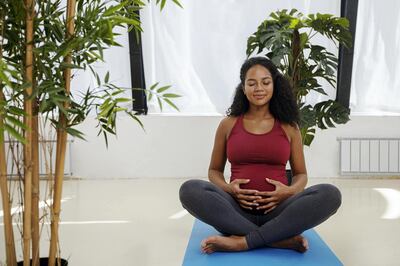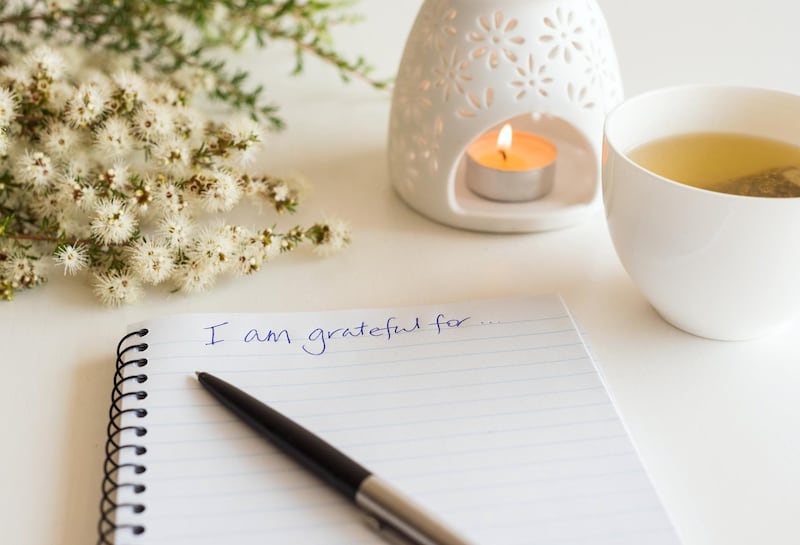The UAE government has introduced stricter measures on residents leaving their homes amid the coronavirus outbreak.
Globally, many people are struggling financially as they endure pay cuts or lose their jobs, while many are finding it difficult to manage the anxiety they feel as the world seemingly crumbles around them.
Never has it been more important for us to pay attention to our mental health.
So, The National asked four experts to share their top tips on how to incorporate a few simple activities into our days in order to boost our moods.
You don’t have to do them all, but “start today,” says mindset coach and mindfulness teacher Laura Carr.
“Make your mental health a priority. Pick one thing that resonates with you and try it. Then, try something else. Slowly putting in place routines, habits and regular patterns will help you feel better through gradual change.”
1. Choose one simple task to achieve, don't overdo it
Many of us believe that now we’re at home, we’ll get so much more achieved, but that often isn’t the case. We need to be honest with ourselves about what we can realistically do in a day, especially when we might be feeling more anxious than usual.
Malak Kamel, a licensed psychologist and clinical director of Dubai’s Thrive Wellbeing Centre, says we need to set a clear and purposeful intention for the day.
“Many of us wake up daily with a long and endless list of tasks,” she says. “While at home we may develop a false sense of being able to conquer the day and get all our tasks done … Be mindful of what you intend to do and set small achievable goals.” These can and should include non-task-oriented items, such as connecting with loved ones, she adds.
2. Keep moving, little by little
You don’t have to put yourself through a gruelling, hour-long HIIT routine or run a marathon on your balcony in order to feel the benefits of movement, says Dubai yoga instructor Dina Ghandour.
Sometimes it’s just a matter of getting off the couch. “Every hour or so, walk around, have a glass of water, make a cup of tea,” she says. “That’s really helpful to get the blood flowing, which can really change how the body is feeling.”
If you are looking for a good at-home workout to do, check out our list of gyms sharing routines online.
3. Try a guided meditation
Apps such as Calm and Headspace are popular and low cost, but Ghandour uses Insight Timer, which is completely free of charge. "Going into a guided meditation using these audio apps can really impact the mind, the body and therefore the nervous system," she says.
These can last anywhere from five minutes for up to an hour and they’re grouped into themes, including anxiety and sleep. “So you can choose what works best for you and your schedule,” Ghandour adds.
The scientific research around the benefits of meditation is complleing, and Carr says just a few minutes of meditation can be beneficial. “[It’s a] way to connect to your inner world each day and opens your heart naturally towards yourself and compassion emerges.”
Take a look at our guide to starting a meditation practice here.
4. Identify real vs imagined worries
Learning to identify the difference between real and hypothetical worries is key, says Kamel. “Which worries can be helpful and which unhelpful? Which worries guide you to behave in a way that promotes yours and others’ growth, safety and security? And which are overwhelming and even debilitating?”
If you’re struggling to see the difference, Kamel advises seeking support from a licensed mental health professional.
Take a look at our list of mental health clinics that offer online services to customers in the UAE.

5. Breathe in and out deeply
"The best type of breathwork to help with anxiety or stress is one where the exhalations are longer than the inhalations," says Ghandour. "This method signals the parasympathetic nervous system, which is what we want to help change our physiology and chemistry out of a fear state to a calm state."
She suggests begin with taking a breath in for three counts, then breathing out for four counts. Do that for a few rounds and then increase to four counts in and five counts out, if possible.
"Another really calming breath exercise is to gently draw air in through the nose and blow softly out, as if through a straw, with lips parted, exhaling long and smoothly out through the mouth."
If you're pregnant, Ghandour, who is also a certified doula, suggests trying an online prenatal yoga class that specifically incorporates breathing techniques.

6. Connect, daily
“There has never been a greater experience of global empathy and community,” says Kamel. “Tap into that and build on that. This will help boost your mental health immunity and resilience.”
Whether that means weekly Zoom meet-ups with friends and family or joining an online community of like-minded strangers, it's important to connect with people at this time. That being said, Kamel warns it's also important to distinguish between conversations you find helpful and those that are detrimental to your mindset.
7. Start a gratitude journal
Over recent years, the idea of having a gratitude journal – the practice of regularly logging what you’re grateful for in your life – has become increasingly popular. And there’s a growing body of research to back-up the technique’s benefits.
This not only includes boosting a person’s psychological health, but people who keep gratitude journals have also reported having fewer aches and pains, better self-esteem and improved sleep. “Reminding yourself of two to three things that you are grateful for is helpful to ease the mind at the end of the day,” says Kamel. “It can reduce those worrisome thoughts from creeping up right before bedtime.”
Carr says even thinking of one thing a day can be helpful. “Let it fill your heart and allow the energy of gratitude to come into your body.”
8. Eat mood-boosting foods
While all most of us want to do right now is reach for comfort food – the cookies, the crisps, the cake – this may not be of service to your health, says nutritionist and health coach Jo Owen.
A few mood-boosting foods she suggests incorporating into your diet include: asparagus, as one cup offers two-thirds of your daily folic acid requirements, which some studies show helps stabilise and boost mood; avocado, of which a slice contains plenty of vitamin B, essential for health brain cells and nerves; blueberries, because they’re an “antioxidant powerhouse”; almonds, which are high in vitamins E and B2, both immune system boosters; and Brazil nuts, which have advantageous anti-inflammatory properties (she advises having no more than three to four a day).
Owen also suggests trying fermented food, such as kombucha and kimchi, which are great for your gut microbiome. “Recent research has provided us with a new astounding fact: your gut microbiome is home to a second brain and that a healthy gut can equal a healthy mind.”
Also make sure you’re drinking plenty of water, she adds, adequate hydration can improve your energy levels, mood and overall well-being. “Drinking water can be soothing at times of intense stress and has natural calming properties so to avoid headaches and fatigue.”

9. Make sure you’re getting your vitamin D
Most people don’t get enough vitamin D at the best of times, never mind when we’re staying indoors. So it’s important to still get some sun on your face, even if that means just getting out on your balcony, front step or simply opening a window, says Owen.
“It makes a huge difference, not only physically but mentally through this challenging phase in our lives.” You can also get the vitamin by eating certain foods, including mushrooms that have been exposed to UV light, or fatty fish, such as salmon, and egg yolks.
10. Get enough sleep
Some of us may be struggling to get some ZZZs with all those negative thoughts swirling around our brains, but getting good sleep is one of the most important things you can do for your physical and mental health, says Owen.
“When your mood is wearing down, so is your immunity, and one of the most valuable things your body needs is to simply rest,” she explains. “It’s during the state of rest that your white blood cells work their magic, so take a load off and get in that nap or go to bed earlier every night … Think of sleep as banked power to improve your mood, reduce irritability and improve your ability to cope with stress.”
To do this, Owen advises setting up a relaxing bedtime ritual, such as having a bath or reading a book, using blackout curtains to block out the light, and going screen-free for 30 minutes to an hour before you get into bed.
Read our experts' guide to getting better sleep here.
11. Repeat a daily affirmation
These are simple, positive statements declaring specific goals. “Beautiful and meaningful affirmations will uplift your day,” says Carr. “These empowering mantras have profound effects on the conscious and unconscious mindset.”
She suggests starting with the words “I am”. “These are the two most powerful words in the English language. Use the present tense and state it in the positive.”
Carr gives an example of an affirmation that’s particularly apt for the times we’re living in now: “I am in charge of how I feel and today I am choosing happiness. I am healthy and safe.”








